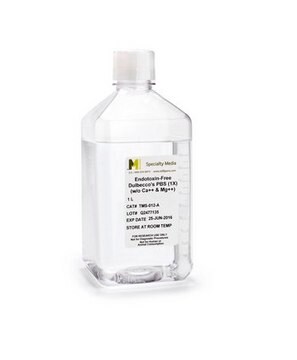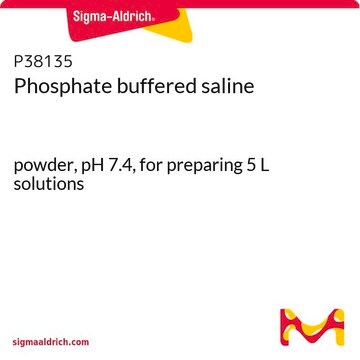D5652
Dulbecco′s Phosphate Buffered Saline
Modified, without calcium chloride and magnesium chloride, powder, suitable for cell culture
Synonym(s):
DPBS
Sign Into View Organizational & Contract Pricing
All Photos(2)
About This Item
Recommended Products
Quality Level
form
powder
technique(s)
cell culture | mammalian: suitable
pH
7.2-7.8
solubility
water: 9.6 g/L, clear
storage temp.
2-8°C
Looking for similar products? Visit Product Comparison Guide
General description
Dulbecco′s Phosphate Buffered Saline is a balanced salt solution (BSS) widely used in tissue culture.
Application
D-PBS is used to wash cells during preparation and serial transfer.
Dulbecco′s Phosphate Buffered Saline has been used:
- as one of the pseudo-physiological solutions to study the in vitro degradation behavior of Fe–20Mn–1.2C alloy
- to dissolve Angelica gigas powder for microencapsulation
- to wash cells as part of cell culture treatments, wound-healing assay, transwell assay and apoptosis assay
- to wash amniotic membrane for cellular analyses
Biochem/physiol Actions
Dulbecco′s Phosphate Buffered Saline serves as an irrigating, transporting, and diluting fluid while maintaining intra- and extracellular osmotic balance. It hydrates cells and acts as a source of bulk inorganic ions essential for normal cell metabolism. This buffered saline acts as the principal energy source for cell metabolism when combined with a carbohydrate, such as glucose. It provides a buffering system to maintain the medium within the physiological pH range.
Quantity
Formulated to contain 9.6 grams of powder per liter of medium.
Other Notes
This D-PBS is formulated without Ca or Mg. Formulations with Ca and Mg added are also available
Storage Class Code
11 - Combustible Solids
WGK
WGK 1
Flash Point(F)
Not applicable
Flash Point(C)
Not applicable
Certificates of Analysis (COA)
Search for Certificates of Analysis (COA) by entering the products Lot/Batch Number. Lot and Batch Numbers can be found on a product’s label following the words ‘Lot’ or ‘Batch’.
Already Own This Product?
Find documentation for the products that you have recently purchased in the Document Library.
Customers Also Viewed
Zhaoxia Zhang et al.
Molecular vision, 24, 434-442 (2018-07-24)
Retinal G protein-coupled receptor (RGR) mRNA is transcribed in the outer nuclear layer of human retinas; however, it is not known whether the RGR gene is expressed in the rod or cone photoreceptors. In this study, we investigate broader expression
Ana C Bohórquez et al.
Journal of colloid and interface science, 506, 393-402 (2017-07-28)
The rotational diffusion of polyethylene glycol coated magnetic nanoparticles in serum albumin solutions was investigated in a range spanning 0mgmL
Functional enhancement of ultrafine Angelica gigas powder by spray-drying microencapsulation
Choi KO, et al.
LWT--Food Science and Technology, 101, 161-166 (2019)
Nunki Hassan et al.
STAR protocols, 1(3), 100156-100156 (2020-12-31)
Patient-derived xenografts (PDXs) are the most valuable tool for preclinical drug testing because they retain the genetic diversity and phenotypic heterogeneity of the original tumor. Acute myeloid leukemia (AML) remains difficult to engraft in immunodeficient mice. This is particularly true
Y Naka et al.
Materials today. Bio, 6, 100054-100054 (2020-06-02)
The in vitro fabrication of wholly vascularized millimeter-sized engineered tissues is still a key challenge in the tissue engineering field. Recently we reported a unique approach 'sedimentary culture' using a collagen microfiber (CMF) to fabricate large-scale engineered tissues. The millimeter-sized
Our team of scientists has experience in all areas of research including Life Science, Material Science, Chemical Synthesis, Chromatography, Analytical and many others.
Contact Technical Service








